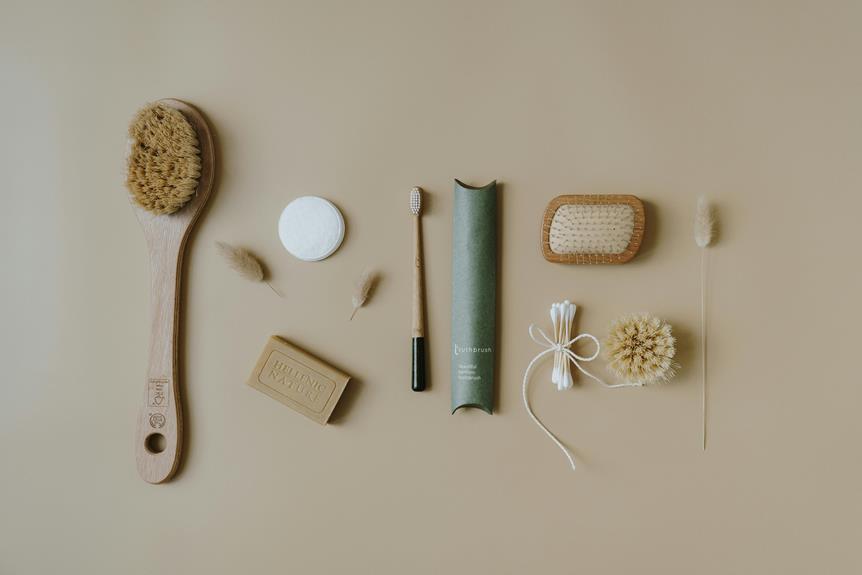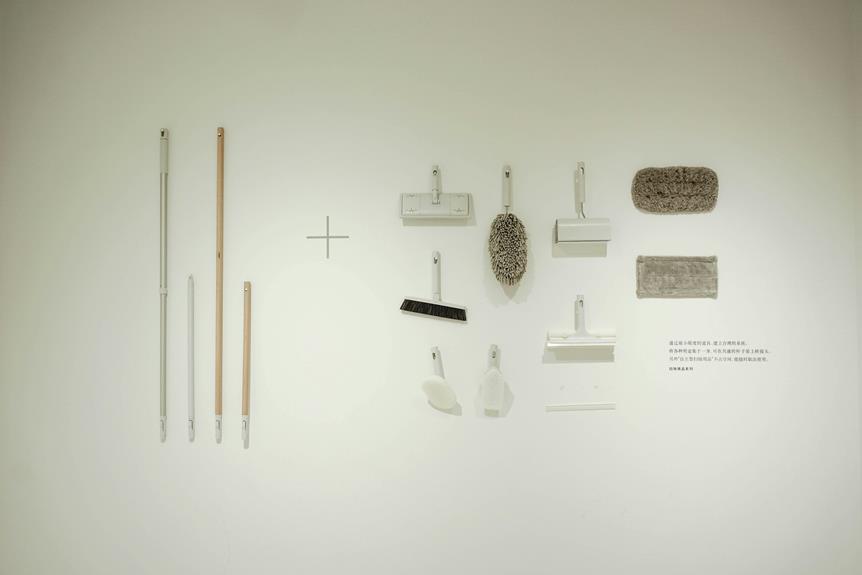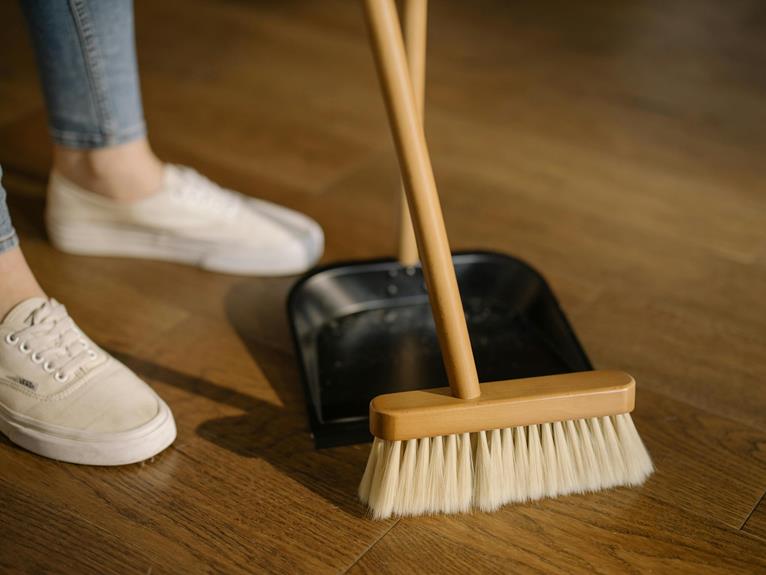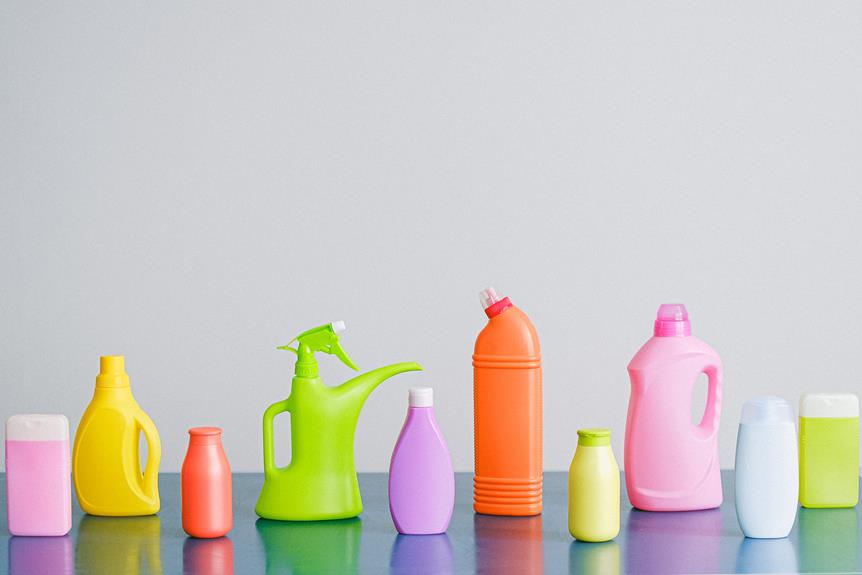Seasonal cleaning is a tradition that allows individuals to declutter and revitalize their living spaces, creating a sense of renewal and freshness as they transition into a new season. In recent years, there has been a growing preference for natural cleaning products, driven by a desire for safer and more sustainable cleaning solutions.
The market now offers a plethora of the best natural cleaning products that harness the power of natural ingredients to effectively clean and sanitize homes without the use of harmful chemicals.
In this discussion, we will explore the top natural cleaning products that can help you tackle your seasonal cleaning tasks effectively and safely.
Vinegar
To kickstart your seasonal cleaning, grab a bottle of vinegar and get ready to tackle those tough stains and odors. Vinegar-based cleaners: effective or overrated? Well, let’s find out.
Vinegar has been used as a cleaning agent for centuries, and good reason. Its acidic nature makes it a powerful tool against dirt, grime, and bacteria. When used correctly, vinegar can be a highly effective cleaner for various surfaces in your home.
Here are some tips and tricks for best results when using vinegar for cleaning. Dilute the vinegar with water to avoid damaging surfaces. A 1:1 ratio is usually sufficient for most cleaning tasks. Let the vinegar sit for a few minutes before wiping or scrubbing to allow it to break down the dirt and stains. Additionally, vinegar can be combined with other natural ingredients like baking soda or lemon juice to enhance its cleaning power.
Is vinegar the ultimate all-purpose cleaner? While it can handle most household cleaning tasks, there are some limitations.
Vinegar isn’t suitable for use on certain surfaces like marble or natural stone, as it can cause etching. It’s also not effective against certain types of bacteria, viruses, or mold. In these cases, it’s best to use specialized cleaners or consult a professional.
When it comes to the environment, vinegar wins over commercial cleaners. Vinegar is non-toxic and biodegradable, making it a safer option for your home and the planet. Commercial cleaners, on the other hand, often contain harmful chemicals that can pollute waterways and harm aquatic life.
Baking Soda
Baking soda is a versatile and effective natural cleaning ingredient that can tackle a variety of household cleaning tasks. Not only is it affordable and readily available, but it also has numerous benefits and uses. If you’re looking for baking soda alternatives, there are a few options you can consider.
One popular alternative is using baking powder, which contains baking soda along with an acid, making it suitable for certain cleaning tasks. Another alternative is using white vinegar, which can be combined with baking soda to create a powerful cleaning solution.
When it comes to baking soda uses, the possibilities are endless. You can use it to clean and deodorize kitchen surfaces, remove stains from clothing, freshen up carpets, and even unclog drains. Baking soda also has the added benefit of being safe to use around children and pets.
In addition to its cleaning capabilities, baking soda has several other benefits. It can help neutralize odors, making it an excellent choice for removing unpleasant smells from your home. You can sprinkle baking soda in your shoes, refrigerator, or trash cans to combat odors effectively.
To make the most of baking soda’s cleaning power, try some baking soda cleaning hacks. For example, you can mix baking soda with water to create a paste and use it to clean grout lines or scrub stubborn stains. You can also sprinkle baking soda on your mattress before vacuuming to remove dust mites and freshen it up.
Lemon Juice
If you’re looking for another powerful natural cleaning ingredient to add to your arsenal, consider the versatile and refreshing properties of lemon juice. Not only does lemon juice add a fresh scent to your cleaning routine, but it also has numerous benefits for household cleaning.
Lemon juice is a natural disinfectant, thanks to its antibacterial properties. It can effectively kill germs and bacteria on various surfaces, making it an excellent choice for sanitizing countertops, cutting boards, and other kitchen surfaces.
Lemon juice is great for removing stains. Its acidic nature helps break down tough stains on fabrics, carpets, and even hard surfaces like tile or grout. In addition to its stain-removing abilities, lemon juice also acts as a natural deodorizer. It can eliminate unpleasant odors from your refrigerator, garbage disposal, and even your cutting boards.
Lastly, lemon juice can refresh and brighten surfaces. Its acidity can remove tarnish from metals, such as brass or copper, and restore their shine.

Essential Oils
Essential oils are a versatile and fragrant addition to your natural cleaning routine. Not only do they offer a pleasant aroma, but they also provide numerous benefits for your health and well-being. When used in cleaning, essential oils can enhance the effectiveness of your DIY cleaning recipes while leaving a refreshing scent behind.
One of the major benefits of essential oils is their aromatherapy properties. Certain oils, such as lavender and eucalyptus, can promote relaxation and reduce stress. So, while you clean your home, you can also create a calming environment for yourself.
When it comes to cleaning, essential oils can be used in various safe and effective ways. They can be added to homemade cleaning solutions, like vinegar and water, to enhance their cleaning power. Additionally, you can mix essential oils with baking soda to create a scrub for surfaces like sinks and countertops.
For disinfecting surfaces, some of the best essential oils to use are tea tree oil and lemon oil. They’ve natural antimicrobial properties that can kill germs and bacteria effectively. By incorporating these oils into your cleaning routine, you can ensure that your home isn’t only clean but also germ-free.
Lastly, essential oils are great for freshening up your home during seasonal cleaning. Oils like citrus, peppermint, and pine can eliminate odors and leave your home smelling fresh and inviting. So, as you tackle your seasonal cleaning tasks, consider adding a few drops of essential oils to your cleaning solutions for a truly refreshing experience.
Castile Soap
Castile soap is a versatile and eco-friendly cleaning agent that can be used in a wide range of household cleaning tasks. Using castile soap for cleaning offers numerous benefits.
It’s made from natural ingredients like olive oil, which makes it a safe and non-toxic option for cleaning your home. It’s free from harsh chemicals and synthetic fragrances, making it ideal for those with allergies or sensitivities.
Castile soap is highly effective in removing dirt, grime, and grease from various surfaces. Whether it’s countertops, floors, or bathroom fixtures, castile soap can tackle tough stains and leave your home sparkling clean.
When it comes to top castile soap brands for natural cleaning, Dr. Bronner’s and Kirk’s are highly recommended. These brands offer a wide range of scents and formulations to suit different cleaning needs.
Moreover, making homemade cleaning products with castile soap is simple and cost-effective. You can create your all-purpose cleaner by mixing castile soap with water and adding a few drops of essential oils for a pleasant scent.
Castile soap is effective in removing tough stains. Whether it’s grease on clothes or buildup on kitchen appliances, apply a small amount of castile soap and scrub gently to lift the stain.
Lastly, using castile soap promotes eco-friendly cleaning. Its natural ingredients and biodegradable formula make it safe for the environment.
Hydrogen Peroxide
Have you ever wondered about the cleaning power of hydrogen peroxide? Well, wonder no more! Hydrogen peroxide is a versatile and effective cleaning agent that can be used in various ways.
Here are some of its uses and benefits:
- Stain remover: Hydrogen peroxide can remove tough stains from clothing, carpets, and upholstery. Simply dampen the stain with hydrogen peroxide, let it sit for a few minutes, and then wash or blot it away.
- Disinfectant: With its antibacterial properties, hydrogen peroxide is a great natural disinfectant. Use it to clean kitchen countertops, cutting boards, and bathroom surfaces to kill germs and bacteria.
- Mold remover: Hydrogen peroxide can effectively kill and remove mold and mildew. Spray it directly on affected areas and let it sit for a while before scrubbing away the mold.
- DIY recipes: You can create your all-purpose cleaner by mixing hydrogen peroxide with water and a few drops of essential oil. It’s a safe and eco-friendly alternative to chemical-based cleaners.
- Alternative uses: Hydrogen peroxide can also be used to whiten teeth, clean glass and mirrors, and even remove earwax buildup.
However, while hydrogen peroxide is generally safe to use, it’s important to take some safety precautions. Always wear gloves when handling it, avoid contact with eyes or skin, and keep it out of reach of children. Also, be sure to test it on a small, inconspicuous area before using it on delicate surfaces to avoid any damage.
Borax
Borax is a versatile cleaning agent that can be used in a variety of household tasks. Its natural properties make it an excellent choice for cleaning and disinfecting various surfaces in your home. Here are some of the uses of borax in household cleaning:
| Uses of Borax in Household Cleaning | Benefits of Using Borax as a Natural Cleaner |
|---|---|
| Removes tough stains from carpets | Non-toxic and safe for the environment |
| Cleans and deodorizes toilets | Kills bacteria and molds |
| Removes soap scum from bathroom tiles | Effective in removing grease and grime |
| Removes odors from laundry | Economical and budget-friendly |
| Unclogs drains and pipes | Versatile and can be used for multiple tasks |
To make a borax cleaning solution, simply mix 1 cup of borax with 1 gallon of warm water. Stir until the borax dissolves completely. This solution can be used for various cleaning tasks, such as mopping floors, wiping countertops, or scrubbing bathroom fixtures.
However, it is important to take safety precautions when using borax. Avoid ingesting it and keep it out of reach of children and pets. Additionally, always wear gloves and eye protection when handling borax.
Apart from cleaning, borax has alternative uses as well. It can be used as a natural weed killer, a fire retardant, or even as a laundry booster.
White Vinegar
White vinegar is a versatile and natural cleaning agent that can be used in various household tasks. Here are some benefits of using white vinegar as a natural cleaning agent:
- It’s non-toxic and safe to use around children and pets.
- It’s effective in removing dirt, grime, and grease from surfaces.
- It can be used on a variety of surfaces such as glass, countertops, and floors.
- It has antibacterial properties that can help kill germs and bacteria.
- It’s a cost-effective alternative to chemical cleaners.
Now, let’s talk about effective ways to use white vinegar for cleaning various surfaces:
- Mix equal parts of white vinegar and water to create a general-purpose cleaning solution.
- Use the solution to wipe down kitchen and bathroom surfaces, including faucets, sinks, and countertops.
- For stubborn stains, apply undiluted white vinegar and let it sit for a few minutes before wiping clean.
- To remove odors from fabrics, add half a cup of white vinegar to the rinse cycle of your laundry.
- Use white vinegar to clean windows and mirrors by spraying it directly onto the surface and wiping it with a clean cloth.
In addition to being effective, using white vinegar as a natural cleaning agent is also eco-friendly. It reduces the use of harmful chemicals that can pollute the environment. To incorporate white vinegar into your regular cleaning routine, here are some tips and tricks:
- Keep a spray bottle of diluted white vinegar handy for quick and easy cleaning.
- Add a few drops of essential oil to the vinegar solution for a pleasant scent.
- Use white vinegar to descale coffee makers, kettles, and showerheads.
- Clean your dishwasher by running a cycle with a cup of white vinegar.
- Use white vinegar to remove water spots and soap scum from shower doors and tiles.
Tea Tree Oil
Tea tree oil, with its natural antimicrobial properties, is a versatile and effective ingredient for natural cleaning. Not only can it be used as a cleaning agent, but it also offers various benefits for your skin and hair.
When it comes to cleaning, tea tree oil is known for its ability to kill germs and bacteria. You can use it to make your all-purpose cleaner by mixing a few drops of tea tree oil with water in a spray bottle. This solution can be used to clean countertops, floors, and even bathroom surfaces. It’s important to note that tea tree oil should always be used with caution and in small amounts, as it can cause skin irritation in some individuals.
Apart from its cleaning properties, tea tree oil is also popular for its acne-fighting abilities. Its antibacterial and anti-inflammatory properties can help reduce acne breakouts and calm irritated skin. To use tea tree oil for acne, dilute a few drops with a carrier oil like coconut oil and apply it to the affected areas using a cotton swab.
Furthermore, tea tree oil can also promote healthy hair growth and soothe an itchy scalp. It helps to unclog hair follicles and nourish the scalp, preventing dandruff and promoting shiny, healthy hair. You can mix a few drops of tea tree oil with your shampoo or conditioner to reap these benefits.
Citric Acid
If you’re looking for another natural cleaning ingredient with multiple uses, citric acid is a great option. Here are five ways citric acid can benefit your cleaning routine:
- Citric acid benefits for skincare: Citric acid is often used in skincare products for its exfoliating properties. It helps to remove dead skin cells, brighten the complexion, and improve the overall texture of the skin.
- Citric acid as a natural cleaner for kitchen surfaces: Citric acid is effective in removing grease, grime, and stains from kitchen countertops, sinks, and appliances. Its acidic nature helps to break down tough residue and leaves surfaces clean and shiny.
- Using citric acid to remove hard water stains: Hard water stains can be stubborn and difficult to remove, but citric acid can help. Its acidic properties dissolve mineral deposits, making it a natural and effective solution for removing hard water stains from faucets, showerheads, and glass surfaces.
- The role of citric acid in homemade laundry detergent: Citric acid is commonly used in homemade laundry detergent recipes. It acts as a natural water softener, helping to remove mineral buildup on clothes and making them softer and brighter.
- Citric acid as a natural alternative to chemical descalers: Descaling agents are often used to remove limescale buildup in appliances like coffee makers and kettles. Citric acid can be used as a natural alternative to these chemical descalers, effectively breaking down limescale and leaving appliances clean and functioning properly.
Incorporating citric acid into your cleaning routine can provide multiple benefits, from skincare to kitchen cleaning and laundry care. Give it a try and experience the power of this versatile natural ingredient.
Olive Oil
Olive oil is a versatile and natural cleaning ingredient that can be used in various ways to keep your home clean and shiny. Using olive oil for cleaning has many benefits. It’s non-toxic, safe to use around children and pets, and doesn’t release harmful chemicals into the air. Olive oil is great for removing dirt, grease, and grime from various surfaces.
There are several common household uses for olive oil as a cleaning agent. It can be used to polish and condition wood furniture, stainless steel appliances, and leather upholstery. Olive oil can also be used as a natural alternative to commercial furniture polish. Simply mix equal parts olive oil and lemon juice, apply to a cloth, and rub onto the furniture to restore its shine.
Making olive oil cleaning products at home is easy and cost-effective. You can make a simple all-purpose cleaner by mixing one part olive oil with two parts water and a few drops of your favorite essential oil for a pleasant scent. This mixture can be used to clean countertops, appliances, and even floors.
When using olive oil as a natural cleaner, there are a few tips to keep in mind. Test it on a small, inconspicuous area first to make sure it doesn’t cause any damage or leave a residue. Use a soft cloth or sponge to apply the olive oil, and always wipe away any excess to prevent a greasy finish.
While there are many natural cleaning products available, olive oil stands out for its versatility and effectiveness. It can be used on a wide range of surfaces and provides great results without the use of harsh chemicals. Give olive oil a try and see the difference it can make in your cleaning routine.
Salt
Salt is a versatile and affordable natural cleaning ingredient that can be used in various ways to effectively clean your home. Here are some benefits of using salt as a natural cleaning agent:
- Salt is a powerful abrasive that can help remove stubborn stains and grime from surfaces like countertops, sinks, and stovetops.
- You can use salt to clean your cutting boards and wooden utensils. Simply sprinkle salt on the surface, scrub with a sponge or cloth, and rinse.
- To make a DIY salt-based cleaning solution, mix equal parts salt and vinegar to create a paste. This can be used to clean bathroom fixtures, tiles, and even tarnished silverware.
- Salt can also act as a natural deodorizer for household cleaning. Sprinkle salt on carpets or rugs, let it sit for a few hours, and then vacuum to remove odors.
- When tackling seasonal cleaning tasks, remember to effectively use salt by adding it to your laundry to brighten clothes and remove stains.
Cornstarch
To continue your exploration of natural cleaning products, let’s now turn our attention to the versatile and economical cleaning agent: cornstarch. Cornstarch has numerous benefits when it comes to cleaning your home.
Not only is it effective at absorbing grease and oil stains, but it also acts as a natural deodorizer, making it perfect for tackling unpleasant odors in your kitchen or bathroom.
One of the creative uses for cornstarch in household cleaning is as a carpet cleaner. Simply sprinkle cornstarch onto your carpets, let it sit for a few minutes, then vacuum it up to remove dirt and freshen the fibers.
Cornstarch can also be used to clean silverware and jewelry. Create a paste by mixing cornstarch with water, apply it to the tarnished items, then rinse and dry for a beautiful shine.
Making homemade cleaning products with cornstarch is easy and eco-friendly. You can create an all-purpose cleaner by mixing cornstarch, vinegar, and water. This solution is safe to use on various surfaces and will leave your home sparkling clean.













